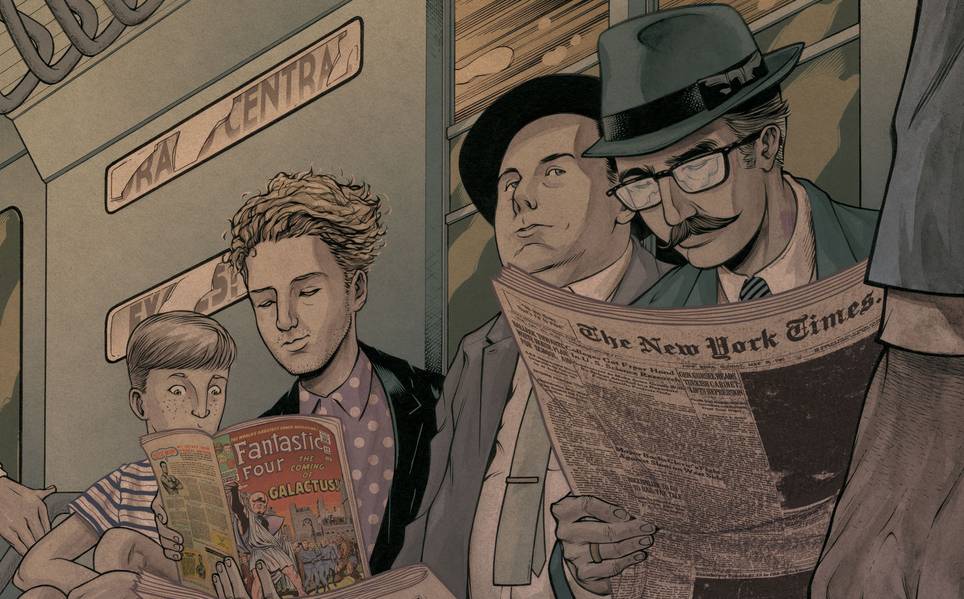Guillermo Ortego is an artist whom you might know from his comics work on X-Factor, Wolverine, Justice League and more. As well as comics work, he is also a prolific illustrator who crafts art for a number of magazines, literary journals and other publications. We sat down with him at London Film and Comic Con 2017 to talk about his work:
How are you? Are you enjoying the con?
I’m okay. Tired. (laughs) The convention is good, though all I’ve really done is be in a panel and then I had lunch.
Which panel was it?
It was called “An Idiot’s Guide to Comics”, and we talked about the many different specialisations within comics and how there’s inkers, pencillers, letterists, colourists, editors, writers…we talked about what each of those roles are really about. I guess it was for people who aren’t that into mainstream comics and who think that a machine does everything. Hopefully it helped some people realise that there’s usually a huge team on every comic.
Sounds like it was a lot of fun…so what have you been working on lately? Any comics work?
Comics-wise, the last thing I did was around ten pages on Astonishing X-Men #1 with Jim Chung, which was pretty cool. Probably my biggest superhero gig, so I was very happy about that. Apart from comics, I’ve been doing a lot of illustration work: I’ve done some more covers for magazines, illustrated a couple of short stories for literary magazines, and I also worked on a strange economics magazine, illustrating a thing about capitalism.
Do you have a preference between comics and illustration?
I mean…yeah. (laughs) The reason I switched between full-time inking and full-time illustration was because I wanted to do something different. As much as it’s a bit tiring in the sense that it feels like I’m starting afresh, I feel like I’m definitely enjoying my day-to-day life more than when I was solely inking, which can be a little brain-dissolving. At the end of the day, [inking] is a lot of muscle memory, and when you’re spending twelve hours of the day just using muscle memory, it can be kind of…exhausting. But obviously I still love comics and inking, I just really like spending my day illustrating. I think it’s also a better position to be in, as a professional, in the sense that I don’t have to rely on just two companies to give me work. I can even say no to those companies now if I’m too busy with illustration work, so I can do a bigger variety of things…which will hopefully make me seem more interesting and diverse. (laughs)
Do you think it would be hard for someone to solely be an inker, if all they wanted to do in their career was ink pages?
I mean…it’s hard in the sense that there’s only two companies in the world that pay you enough to make a living out of it. But once you break in and I guess once you’re good enough, if you keep going to conventions and meeting a lot of pencillers, you should be able to get monthly work that can potentially keep you going. I guess the whole inker situation has a bigger question mark over it than a lot of other positions…maybe ten years down the line, only very few old-school inkers will still be working. A lot of pencillers will be moving to digital, and doing their own inks straight over layouts. Which I guess makes sense. Inking is just one step of the process–no-one should rely on specific roles like that, if you haven’t diversified your work and your portfolio, you’ll be relying on those two companies which is not the best place to be in.
Do you have any more comics career advice for people?
What I would say is for people to learn how to live with the frustrations of making art. You’re 100% going to get frustrated, and there’ll be good days and bad days…days where you think your work is shit, and then days where you think “Hey, I could make a living out of this!”. I would say–as cliche as it is–to just not give up and to keep going, but you need to put the hours in. You need to work through the days when you feel down, as hard as that is sometimes. Keep on Instagramming, updating your portfolio, contacting clients, going to conventions…non-stop hustling. Hopefully others will give up where you won’t, and that’s how you get better, and how people notice you. You just have to push through.
Thanks to Will for taking the time to talk to us! You can find out more about his work at: willortego.com/.
Some of the coverage you find on Cultured Vultures contains affiliate links, which provide us with small commissions based on purchases made from visiting our site. We cover gaming news, movie reviews, wrestling and much more.



